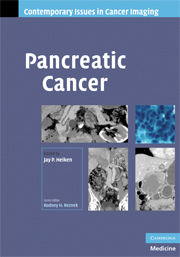Book contents
- Frontmatter
- Contents
- Series Foreword
- Preface to Pancreatic Cancer
- Contributors
- 1 Epidemiology and genetics of pancreatic cancer
- 2 Pathology of pancreatic neoplasms
- 3 Multi-detector row computed tomography (MDCT) techniques for imaging pancreatic neoplasms
- 4 Magnetic resonance imaging (MRI) techniques for evaluating pancreatic neoplasms
- 5 Imaging evaluation of pancreatic ductal adenocarcinoma
- 6 Imaging evaluation of cystic pancreatic neoplasms
- 7 Imaging evaluation of pancreatic neuroendocrine neoplasms
- 8 Role of endoscopic ultrasound in diagnosis and staging of pancreatic neoplasms
- 9 Surgical staging and management of pancreatic adenocarcinoma
- 10 Treatment of locally advanced and metastatic pancreatic cancer
- 11 Rare pancreatic neoplasms and mimics of pancreatic cancer
- Index
- Plate section
Preface to Pancreatic Cancer
Published online by Cambridge University Press: 23 December 2009
- Frontmatter
- Contents
- Series Foreword
- Preface to Pancreatic Cancer
- Contributors
- 1 Epidemiology and genetics of pancreatic cancer
- 2 Pathology of pancreatic neoplasms
- 3 Multi-detector row computed tomography (MDCT) techniques for imaging pancreatic neoplasms
- 4 Magnetic resonance imaging (MRI) techniques for evaluating pancreatic neoplasms
- 5 Imaging evaluation of pancreatic ductal adenocarcinoma
- 6 Imaging evaluation of cystic pancreatic neoplasms
- 7 Imaging evaluation of pancreatic neuroendocrine neoplasms
- 8 Role of endoscopic ultrasound in diagnosis and staging of pancreatic neoplasms
- 9 Surgical staging and management of pancreatic adenocarcinoma
- 10 Treatment of locally advanced and metastatic pancreatic cancer
- 11 Rare pancreatic neoplasms and mimics of pancreatic cancer
- Index
- Plate section
Summary
Our ability to diagnose and stage pancreatic adenocarcinoma, cystic pancreatic neoplasms and pancreatic neuroendocrine neoplasms continues to improve, owing to advances in ultrasound, computed tomography (CT), and magnetic resonance imaging (MRI). Consequently, imaging has become an increasingly critical component in the clinical management of patients with pancreatic neoplasms. Accurate staging is important to determine appropriate treatment and to minimize the number of patients who undergo unnecessary laparotomy. In addition, much has been learned recently about the epidemiology and genetics of pancreatic neoplasms, which may lead to novel approaches to the prevention, diagnosis, and treatment of pancreatic cancer.
As with other malignancies, a multidisciplinary team approach is essential to optimizing patient care and providing the most appropriate treatment. This issue of Contemporary Issues in Cancer Imaging provides a detailed review, not only of the imaging evaluation of pancreatic neoplasms, but also the epidemiology, genetics, pathology, and clinical management of these tumors. Separate chapters focus on the surgical staging and management of pancreatic cancers and the treatment of locally advanced and metastatic disease. Thus, although this volume is directed primarily at radiologists, it also will be of considerable value to other medical specialists involved in the care of patients with pancreatic cancer.
- Type
- Chapter
- Information
- Pancreatic Cancer , pp. xPublisher: Cambridge University PressPrint publication year: 2008



